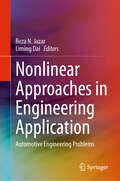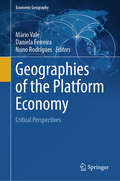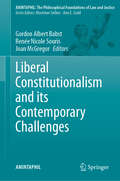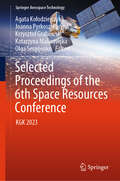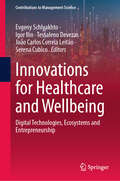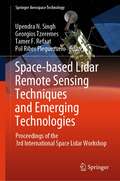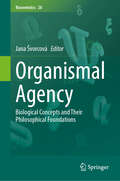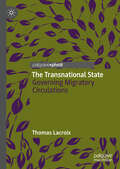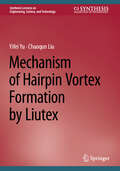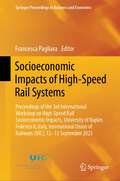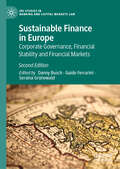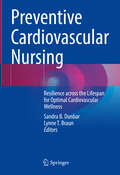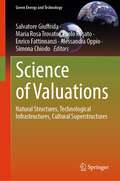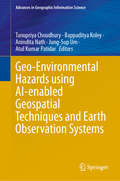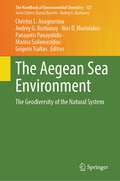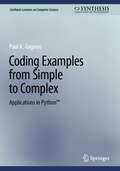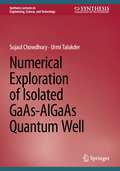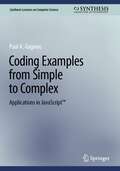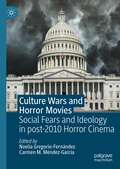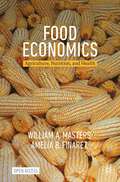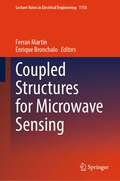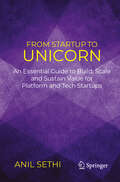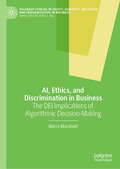- Table View
- List View
Nonlinear Approaches in Engineering Application: Automotive Engineering Problems
by Reza N. Jazar Liming DaiThis book focuses on the latest applications of nonlinear approaches in engineering and addresses a range of scientific problems. Examples focus on issues in automotive technology with a strong emphasis on application, physical meaning, and methodologies of the approaches. The book’s chapters are written by world-class experts who advance the future of engineering by discussing the development of more optimal, accurate, efficient, cost, and energy-effective systems. Topics covered are of high interest in engineering and physics, and an attempt has been made to expose engineers and researchers to a broad range of practical topics and approaches. Nonlinear Approaches in Engineering Application: Automotive Engineering Problems is appropriate for researchers, students, and practicing engineers interested in the applications of nonlinear approaches to solving engineering and science problems.
Geographies of the Platform Economy: Critical Perspectives (Economic Geography)
by Mário Vale Daniela Ferreira Nuno RodriguesThis book provides a wider understanding of the geographies of the platform economy, focusing on the critical perspectives that have emerged on this new economic and digital context. Technological development, particularly the emergence of big data in combination with platforms, additive manufacturing, advanced robotics, machine learning and the internet of things, has created conditions for the appearance of a new economic context predominantly based on new forms of services. This new economic context has been described as the platform economy or platform capitalism. Other designations have also appeared to describe particular consequences of this new phenomena, such as the gig economy or the sharing economy.There is a significant diversity of scientific fields that are studying topics related to the platform economy. Several studies have emerged from different fields, including, but not limited to, geography, economy, sociology, information science, management, marketing, or the humanities. However, geography has become an important field to understand the platform economy given its critical position over the economic, cultural, and social issues that stem from this new economic context. The purpose of this book is to approach these discussions and offer a critical view of the platform economy from the perspective of geography, stemming from the different subfields of the discipline and not restricted to what has been referred to as Digital Geography.This book will appeal to scholars, undergraduate and postgraduate students in the social sciences. It will be particularly relevant to those with research interests in digital geographies and economic geography, economics and business.
Liberal Constitutionalism and its Contemporary Challenges (AMINTAPHIL: The Philosophical Foundations of Law and Justice #12)
by Joan McGregor Gordon Albert Babst Renée Nicole SourisThe edited volume brings together contemporary work by philosophers, legal scholars, and political theorists. This volume presents relevant understandings of the common good, democracy, liberty, and law, and situates them in the context of contemporary countervailing pressures posed by issues in education, access to medical treatment in a pandemic, and the media. Motivated to ascertain how democracy is threatened by a variety contemporary challenges, the authors examine core aspects of law, representative democracy, and constitutionalism to shed light on worrisome contemporary phenomena such as social media-driven conspiracy theories, unequal access to education and medical treatment, among other topics.
Selected Proceedings of the 6th Space Resources Conference: KGK 2023 (Springer Aerospace Technology)
by Katarzyna Malinowska Agata Kołodziejczyk Joanna Pyrkosz-Pacyna Krzysztof Grabowski Olga SergijenkoThis book collects advances, innovations, and applications in the field of space resources and exploration, as presented by international researchers at the 6th Space Resources Conference (KGK), held in Kraków, Poland on May 15-16, 2023. The conference serves as a forum for discussion on the state-of-the-art technologies applicable to current challenges of space exploration, the use of space resources to improve the living conditions of humans and protect Earth’s natural environment, and the latest research results on space resource extraction, transportation, manufacturing in space, and how to develop settlements on the Moon and Mars. Topics include bioastronautics and life support systems, Earth observation and sensors issues, space law, subspace missions, space industry, society and space, space education, and space structures design and operations. The book, which was selected by means of a rigorous peer-review process, presents a wealth of exciting ideas that will open novel research directions and foster multidisciplinary collaboration among different specialists.
Innovations for Healthcare and Wellbeing: Digital Technologies, Ecosystems and Entrepreneurship (Contributions to Management Science)
by Tessaleno Devezas Serena Cubico Igor Ilin João Carlos Correia Leitão Evgeny SchlyakhtoVarious socio-demographic, medical, technological, and managerial trends determine the emergence and development of the concept of the “Smart Hospital”, as well as the development and implementation of appropriate complex architectural models in the management practice of medical organizations. In turn, such medical organizations require an innovative health care ecosystem to provide medically and economically efficient healthcare services. This book examines various approaches to the modern healthcare system to provide an effective internal environment for the medical organization as well as an effective external environment for better interaction with all stakeholders of the greater healthcare system. It addresses the challenges of digital technology adoption in specialized areas (e.g., cardiology, surgery, neonatology, etc.) and of the dissemination of knowledge, technology, innovation, and entrepreneurial initiatives as well as communication between stakeholders. It then explores the development of the Smart Hospital by analyzing the internal architecture of medical organizations, key factors of their transformation, architecture of IT and digital technologies and data-driven management. Finally, this book explores the ways in which entrepreneurship and entrepreneurial leadership promote innovation and well-being in different organizational contexts, with special emphasis on human resource management, intellectual capital, and abusive leadership of public, social, and business sector contexts.
Space-based Lidar Remote Sensing Techniques and Emerging Technologies: Proceedings of the 3rd International Space Lidar Workshop (Springer Aerospace Technology)
by Upendra N. Singh Georgios Tzeremes Tamer F. Refaat Pol Ribes PleguezueloThis book gathers the latest advances, innovations, and applications in the field of space lidar missions, techniques, and technologies, as presented at the 3rd International Workshop on Space-Based Lidar Remote Sensing Techniques and Emerging Technologies (LIDAR), held in Milos Island, Greece, on June 18–23, 2023. It covers highly diverse topics such as space-based lidar techniques and methodologies; challenges experienced in space lidar missions; planning of new space earth observation lidar missions, including monitoring of topography, cryosphere, biomass, greenhouse and trace gases clouds, aerosols; exploration lidars, including entry, decent and precision landing, as well as hazard avoidance for Mars & Lunar landers missions; results and plans for simulations, airborne experiments and demonstrations as precursors for space missions; emerging space lidar technologies, particularly in lasers, optics, electronics and detectors as well as space lidar reliability and influencing factors, such as effects of the space environment. Written by leading scientists and technologists from government agencies, industries and universities, and selected by means of a rigorous international peer-review process, the contributions highlight numerous exciting ideas that will spur novel research directions and foster multidisciplinary collaborations.
Organismal Agency: Biological Concepts and Their Philosophical Foundations (Biosemiotics #28)
by Jana ŠvorcováThis book explores the notion of organismal agency from the perspective of both philosophy and biology. The two sections of the book delve into parallel themes, including distinctions between organic and inorganic nature, self-organization, autonomy, self-presentation, memory, umwelt, and environmental influence. The philosophical part focuses on the influential thinkers who shaped our perception of living entities beyond mere mechanisms. It scrutinizes the concepts of organism and nature in the works of Aristotle, Kant, Schelling, and various processualists. Each chapter explores facets of their ideas that directly or indirectly foreshadowed or contributed to the formulation of the concept of agency. The biological part of the book investigates various concepts associated with agency such as experience, meaning attribution, and phenotypic plasticity, as well as reproduction, organisational constraints, modularity, development of integrated phenotypes, organismal choices, or self-representation through animal organisation. In essence, this work offers a comprehensive examination of organismal agency and its philosophical and biological foundations. Collaboratively authored by individuals from several institutions, this publication caters primarily to researchers and students working at the intersection of philosophy and biology.
The Transnational State: Governing Migratory Circulations
by Thomas LacroixThis work in two parts examines the relations between transnational societies and states. The second volume of this work contends that current policies meant to control or enhance transnational flows have led to the emergence of a transnational policy apparatus coined the transnational state. This book proposes an innovative conceptual framework to grasp the transformations of the contemporary state in both sending and receiving countries. It shows how states expand beyond national territorial limits by reaching out to migrants where they are. In response to the migrants’ endeavours to circumvent the constrains imposed by selective migration policies, public authorities expand the reach of their control beyond (externalisation), within (internalisation) and at (expansion) borders. A totalitarian temptation seems to have seized contemporary state bureaucracies, affecting the very nature of borders and societies. The core argument of this research is that the development of the transnational state is not random. It is a process shaping and shaped by the structures of the transnational society.
Mechanism of Hairpin Vortex Formation by Liutex (Synthesis Lectures on Engineering, Science, and Technology)
by Yifei Yu Chaoqun LiuThis book presents the importance of the mechanism of hairpin vortex formation to understanding flow transition, turbulence, and flow control. This book blends direct numerical simulation (DNS) and mathematical analysis with experiments to create a foundation for understanding turbulence. The authors discuss hairpin vortex as a main component of transitional flow and turbulent flow. In addition, Liutex is utilized and described as a theoretical system that presents valid tools for turbulence research. Readers are exposed to understanding 3D and non-linear instability; the Lambda vortex formation; sweeps, ejections, and shear instability; the Kelvin-Helmholtz instability and vortex ring formation; and turbulence generation and sustenance.
Socioeconomic Impacts of High-Speed Rail Systems: Proceedings of the 3rd International Workshop on High-Speed Rail Socioeconomic Impacts, University of Naples Federico II, Italy, International Union of Railways (UIC), 12–13 September 2023 (Springer Proceedings in Business and Economics)
by Francesca PagliaraThis book offers new insights into the wider socio-economic impacts of high-speed rail (HSR). Over the past few decades, significant investments have been made in these systems around the world. The use of public funds for the construction of high-speed rail offers a range of benefits, such as time savings, increased comfort, and reduced traffic congestion, as well as broader economic benefits, including the advancement of less developed regions. These proceedings feature papers presented at the 3rd International Workshop on the Socioeconomic Impacts of High-Speed Rail. The focus is on HSR impacts on the environment, on the land use system, on investment, on the tourism industry, on inclusion and on cooperation vs integration with other transport modes. The book provides an overview of the current state of practice from both theoretical and empirical perspectives. Consequently, it will be of interest to scholars of transportation economics and related fields, as well as transportation industry professionals.
Sustainable Finance in Europe: Corporate Governance, Financial Stability and Financial Markets (EBI Studies in Banking and Capital Markets Law)
by Guido Ferrarini Danny Busch Seraina GrünewaldThis second edition brings together the views of expert academics and practitioners on the latest regulatory developments in sustainable finance in Europe and includes 5 new chapters on sustainable remuneration, reporting, lending, green monetary policy and ESG. The volume includes a wide range of cutting-edge issues, which relate to three main themes along which the volume is structured: (1) corporate governance; (2) monetary policy and financial stability ; and (3) financial markets. With individual contributions deploying different methods of analysis, including theoretical contributions on the status quo of macro-financial research as well as law and economics approaches, the collection encourages interdisciplinary readership and will appeal to those researching capital markets law, European financial law, and sustainable finance, as well as practitioners within the finance industry.
Preventive Cardiovascular Nursing: Resilience across the Lifespan for Optimal Cardiovascular Wellness
by Sandra B. Dunbar Lynne T. BraunThis book provides a comprehensive overview of essential concepts and evidence that guide the practice of contemporary preventive cardiovascular nursing. The sections incorporate a lifespan approach to cardiovascular wellness, and provide perspectives on sources of known and emerging cardiovascular risk factors as well as the spectrum of multidimensional factors including biological, behavioral, psychological and sociocultural influences on cardiovascular wellness, risk, and the evolution of cardiovascular conditions. Unique features address: 1) building resilience across the lifespan such that optimal cardiovascular wellness can be attained within multiple contexts of health states to increase a healthy lifespan and longevity; 2) behavior change skills for risk factor reduction; 3) risk factors and risk reduction approaches with special populations defined by gender, , age and aging, heath states, and health equity issues; and 4) high level roles for cardiovascular nurses as provider - risk assessor, communicator and care provider; educator, leader, patient and health advocate. Relevant case studies are included throughout to facilitate the application of the content. This book fills a gap in that there is no other book on preventive cardiovascular nursing care and roles , and it provides support for the nurse to lead relevant interdisciplinary teams. The book will empower nurses to build knowledge and skills for cardiovascular prevention and to provide leadership for optimal cardiovascular wellness for patients and communities.
Science of Valuations: Natural Structures, Technological Infrastructures, Cultural Superstructures (Green Energy and Technology)
by Salvatore Giuffrida Maria Rosa Trovato Paolo Rosato Enrico Fattinnanzi Alessandra Oppio Simona ChiodoThis volume collects the best papers presented at the 2019 Conference SIEV (Italian Society of Appraisal and Valuation) on the Science of Evaluation foundations, actuality, and prospects. The book consists of twenty-six papers and is organized into four parts: the first one collects reflections on the nature of the value judgement, on the truth of the evaluative statement, and on the authenticity its contents, the values; the next three present operational experiences in the three fields of natural, urban and cultural heritage where the knowledge of the value of the human space, supports decisions and policies, highlighting feature concerning: value and valuations in the dialectic between earth and the city; the value bearers between heuristic and normatively; the role of valuation for the complementarity of rules and creativity. The book is being published in the midst of the new radical transformations of the equilibrium between social system and environment generated by the serious and unexpected crises of the third decade of this century. Reflections on the reality that fills evaluative statement with truth – the reality of values – is more topical than ever in a historic phase in which the role of democracies and the destiny of civil coexistence is called into question, claiming the order of unamendable values like truth, justice and beauty. The book brings together experiences that focus on the “intentional evaluative consciousness” as a condition for the responsibility of the subject - individual and collective - concerning the saliences and urgencies most significantly contributing to the formation of orderly communities.
Geo-Environmental Hazards using AI-enabled Geospatial Techniques and Earth Observation Systems (Advances in Geographic Information Science)
by Jung-Sup Um Tanupriya Choudhury Bappaditya Koley Anindita Nath Atul Kumar PatidarThis edited collection provides a comprehensive exploration of cutting-edge ideas, approaches, simulations, evaluations of risk, and systems that enhance the practicality of current geospatial technologies for reducing hazard risks. The various sections within this book delve into subjects such as the foundational principles of Earth Observation Systems (EOS) and geospatial methodologies. Additionally, the text serves as an advisory resource on the collaborative use of satellite-derived data and artificial intelligence to track and alleviate geo-environmental threats. The volume imparts extensive understanding regarding geo-environmental dangers and their analysis via EOS along with geospatial strategies. It encompasses key hazard-related themes including coastal degradation, predisposition to landslides, mapping vegetation coverages, tropical storm patterns, soil depletion due to erosion processes, vulnerability to rapid or extended flooding events, variations in oceansurface temperatures alongside chlorophyll-a levels; it also addresses assessments related to groundwater reserves and quality measures as well as sustainable management practices for watersheds that support community livelihoods—all through leveraging AI-integrated geospatial tools in conjunction with earth observation technologies. Furthermore, this work engages in discourse about systems designed for mitigating these ecological challenges sustainably. Scholars engaged in research activities; educational professionals; those involved in landscape design; engineers working at ground level; individuals responsible for policy-making—all who are concerned with geo-environmental hazards or associated domains—will find valuable insights within these pages.
The Aegean Sea Environment: The Geodiversity of the Natural System (The Handbook of Environmental Chemistry #127)
by Andrey G. Kostianoy Christos L. Anagnostou Ilias D. Mariolakos Panayotis Panayotidis Marina Soilemezidou Grigoris TsaltasThis is the first of three Books that together provide an integrated picture of the Aegean Sea, presenting the natural components of the system (Book I and Book II) as well as the human presence in the extended area (Book III). The Aegean Sea, also called Aegean Archipelagos, is an open, complex, and diverse marine system situated between the Black Sea and the Eastern Mediterranean, with different compartments and interactions. This book provides an in-depth exploration of the Aegean Sea's natural systems, shedding light on its geodiversity, geological dynamics, air-land-sea interaction, hydrology, suspended matter and sediments. Divided into 4 parts, the book introduces the diversity, geological dynamics, and evolution of the natural system of the Aegean Sea (Parts 1 and 2), followed by a section devoted to the land-sea interaction in the Aegean coastal system where experts in the field explore freshwater and matter inputs into the Aegean coastal system, as well as the coastal morphodynamics and evolution of the Aegean Sea, its adjacent land areas, and islands. In Part 3, the book delves into the air-sea interaction over the Aegean Sea, presenting its intricate dynamics, including heat and freshwater fluxes, wind waves, tides, and atmospheric deposition. The book closes with a section focused on the hydrology, chemistry, and dynamics of water masses and the sea bottom, providing insights into suspended matter and fluxes, sediments, climate changes, and the intricate nutrient and carbon dynamics within the Aegean Sea ecosystem (Part 4). Given the breadth and depth of its coverage, this book serves as a valuable resource for researchers, scholars, and students interested in marine geology, oceanography, and environmental analysis, as well as policymakers and conservationists seeking a comprehensive understanding of the Aegean Sea's complex natural systems.
Coding Examples from Simple to Complex: Applications in Python™ (Synthesis Lectures on Computer Science)
by Paul A. GagniucThis book provides a comprehensive guide to Python, which stands as the cornerstone of modern programming and is the main computer language driving software prototyping in both industry and research. The author introduces readers to the rich world of Python, taking them on a journey from the fundamentals to advanced topics, equipping them with the knowledge and skills needed to become a proficient Python developer or scientist. The book provides a treasure trove of practical examples, meticulously crafted to deepen the reader understanding of Python. This comprehensive exploration is designed to cater to novice learners as well as mature developers and scientists, equipping them with the requisite knowledge and competencies to harness the Python full potential in their respective projects. From the basics of variable naming and program structure to complex matrix operations, recursion, and object-oriented programming, this book covers it all. This book is part of a seriesof works designed to present both the examples and their explanations in various computer languages, as close to a mirror version as possible.
Numerical Exploration of Isolated GaAs-AlGaAs Quantum Well (Synthesis Lectures on Engineering, Science, and Technology)
by Sujaul Chowdhury Urmi TalukderThis book begins with the eigenvalue equation of energy and presents calculation of the energy spectrum of GaAs-AlGaAs Quantum Well using finite difference method and knowledge of potential energy profile, without using expressions for eigenfunctions, continuity of eigenfunctions, or their spatial derivatives at the two abrupt potential steps. The authors find that the results are almost the same as those obtained by solving numerically using regula falsi method, and transcendental equations that are obeyed by the energy levels, where the transcendental equations are obtained by requiring continuity of eigenfunctions and of their spatial derivatives at the two potential steps. Thus, this book confirms that it is possible to numerically calculate the energy spectrum of Quantum Well by the finite difference method when it is not correct or when it is not possible to use continuity of eigenfunctions and their spatial derivatives at the two abrupt potential steps. The authors also showthat it is possible to use the finite difference method in cases where the potential steps are non-abrupt. The book demonstrates this by calculating the energy spectrum of isolated parabolic Quantum Well of finite depth using finite difference method.
Coding Examples from Simple to Complex: Applications in JavaScript™ (Synthesis Lectures on Computer Science)
by Paul A. GagniucThis book provides a comprehensive guide to JavaScript, which stands as the cornerstone of modern programming and is the main computer language driving the Internet. The author introduces readers to the rich world of JavaScript, taking them on a journey from the fundamentals to advanced topics, equipping them with the knowledge and skills needed to become a proficient science and engineering oriented JavaScript developer. The book provides a treasure trove of practical examples, meticulously crafted to deepen the reader understanding of JavaScript. This comprehensive exploration is designed to cater to novice learners as well as mature developers and scientists, equipping them with the requisite knowledge and competencies to harness the JavaScript full potential in their respective projects. This book is part of a series of works designed to present both the examples and their explanations in various computer languages, as close to a mirror version as possible.
Culture Wars and Horror Movies: Social Fears and Ideology in post-2010 Horror Cinema
by Noelia Gregorio-Fernández Carmen M. Méndez-GarcíaIn this volume, contributors explore the deep ideological polarization in US society as portrayed in horror narratives and tropes. By navigating this polarized society in their representation of social values, twenty[1]first-century horror films critically frame and engage conflicting and divisive ideological issues. Culture Wars and Horror Movies: Social Fears and Ideology in Post-2010 Horror Cinema analyses the ways in which these “culture wars” make their way into and through contemporary horror films, focusing on the post-2010 US context and its fundamental political divisions.
Food Economics: Agriculture, Nutrition, and Health (Palgrave Studies in Agricultural Economics and Food Policy)
by William A. Masters Amelia B. FinaretFood Economics provides a unified introduction to the economics of agricultural production, business decisions, consumer behavior, and the government policies that shape our food system. This open access textbook begins with economic principles derived using graphical techniques to explain and predict observed prices, quantities, and other outcomes as a result of individual choices influenced by market structure and public policies. The second half of the book explores available data globally and for the US, covering a wide range of questions in agriculture and economic development, food marketing, and consumption. Food Economics and its accompanying online resources are designed for advanced undergraduate or introductory graduate courses in agriculture, food, and nutrition policy. The book covers the standard diagrams taught in principles-level courses, with concrete examples and practical insights regarding food production, consumption, and trade. Online resources include data sources, and course materials, including slides, exercises, exams, and answer keys.
Coupled Structures for Microwave Sensing (Lecture Notes in Electrical Engineering #1150)
by Ferran Martín Enrique BronchaloThis book offers a comprehensive and timely review of planar microwave sensors based on coupled structures. Gathering chapters contributed by the most authoritative researchers on this topic, it presents various strategies for sensor performance optimization using coupled lines, directional couplers, and coupled resonators (either distributed or semi-lumped), focusing mainly on sensitivity optimization, and covering chains of coupled resonators as well. The book also reports on analytical methods, design formulas, sensor validation tests, with both simulation and experimental methods, describing some relevant practical applications. Mainly reflecting the research activity carried out by the different contributors in the last years, this book also includes two introductory chapters to help readers who are not very familiar with microwave sensing technologies and coupled structures. All in all, this book addresses advanced graduate students and researchers involved in microwave and sensor technologies, and may be of interest for engineers and professionals as well, working in areas as diverse as wireless sensors and sensor networks, biosensing, chemical sensing, motion control, microfluidics, Internet of Things (IoT), and smart systems.
From Startup to Unicorn: An Essential Guide to Build, Scale and Sustain Value for Platform and Tech Startups
by Anil SethiIf you're looking for a comprehensive guide to help make your startup successful, this book is a must-read. It covers the unique challenges of technology and platform-driven entrepreneurship, providing entrepreneurs with the tools they need to sustain growth and relevance.Technology startups face the risk of failure even after finding a product-market fit. This is due to limitations in scaling. Platform-driven startups can scale rapidly. However, they carry a high risk of failure. This book helps entrepreneurs identify the factors that can sustain technology startup growth, make early decisions, and limit risk. It also offers guidance to platform startups to mitigate the risk of failure. Featuring examples of successful startups as well as others that failed, the book offers a holistic view of entrepreneurship that highlights its importance to the broader ecosystem.This book is ideal for entrepreneurs who want to take their startup to the next level and sustain its growth. With a focus on inclusive entrepreneurship and sustaining competitive advantage, it is equally relevant for family-run companies that prioritise sustained value over generations. If you want to succeed in today's highly competitive startup landscape, this book is a valuable resource.
The Financial Metaverse: Tokens, Derivatives and Other Synthetic Assets
by Albin SpinnerDerivative trading? That's something for Wall Street types, right? Maybe, but it also affects everyone else in ways that are still little appreciated. Futures traders have paralysed the global trade of nickel, a key component in the battery of your neighbour’s Tesla. For a few minutes one trading day during the pandemic, sellers of crude oil were paying buyers to take the stuff, defying the very notion of trading, in an episode straight out of “Alice in Wonderland”.Understanding how this obscure corner of finance works (and what happens when it doesn't) is a key pillar of financial literacy today. If you are a financial markets practitioner, everyday investor, academic, regulator, policy maker or kitchen-table economist, you need to know how financial derivatives really work and be aware of the emerging digital innovations that makes this market the highest stake metaverse.
AI, Ethics, and Discrimination in Business: The DEI Implications of Algorithmic Decision-Making (Palgrave Studies in Equity, Diversity, Inclusion, and Indigenization in Business)
by Marco MarabelliThis book takes a historical approach to explore data, algorithms, their use in practice through applications of AI in various settings, and all of the surrounding ethical and DEI implications. Summarizing our current knowledge and highlighting gaps, it offers original examples from empirical research in various settings, such as healthcare, social media, and the GIG economy.The author investigates how systems relying on a binary structure (machines) work in systems that are instead analogic (societies). Further, he examines how underrepresented populations, who have been historically penalized by technologies, can play an active role in the design of automated systems, with a specific focus on the US legal and social system.One issue is that main tasks of machines concern classification, which, while efficient for speeding up decision-making processes, are inherently biased. Ultimately, this work advocates for ethical design and responsible implementation and deployment of technology in organizations and society through through government-sponsored social justice, in contrast with free market policies.This interdisciplinary text contributes to the timely and relevant debate on algorithmic fairness, biases, and potential discriminations. It will appeal to researchers in business ethics and information systems while building on theories from anthropology, psychology, sociology, management, marketing, and economics.
Conflict Resolution and Peacemaking in Islam: Theory and Practice (Palgrave Series in Islamic Theology, Law, and History)
by Harris Sadik KirazliThe book explores Islamic perspectives on conflict resolution and peacemaking. It delves into key topics such as the principles of Islamic conflict resolution, historical examples of peaceful resolutions, and contemporary challenges faced by Muslim societies. By addressing these topics, the book aims to provide insight into Islamic teachings and practices that can contribute to building bridges and fostering peace in diverse contexts. The book is important and relevant due to the increasing need for understanding and promoting peaceful resolutions in today's world, particularly in regions influenced by Islam. It offers a comprehensive examination of the principles and methods of conflict resolution within an Islamic framework, shedding light on the rich history of peacemaking within Muslim societies. By highlighting Islamic perspectives on peace, the book aims to bridge cultural divides and foster dialogue, promoting a greater understanding and appreciation of the contributions Islam can make to conflict resolution. The book seeks to address the prevalent misconceptions and stereotypes surrounding Islam's approach to conflict resolution. It aims to challenge the notion that Islam is inherently associated with violence or lack of peaceful solutions. By presenting authentic Islamic teachings and historical examples of peaceful resolutions, the book endeavours to contribute to a more nuanced and accurate understanding of Islam's role in promoting conflict resolution and peacemaking. It offers readers an opportunity to explore Islamic perspectives on resolving conflicts, encouraging dialogue, and cultivating a more peaceful world.
